I hope they are safe, and get found soon.
Follow the links to watch the videos on the bbc website.
http://www.bbc.co.uk/news/world-africa-43240495
Dapchi kidnappings: Nigeria families' heartbreak and despair
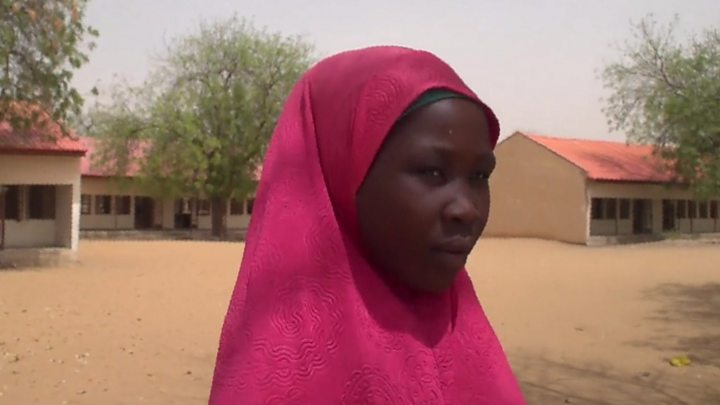
The kidnapping of 110 girls from a school in the north-eastern Nigerian town of Dapchi bears striking similarities to the 2014 abduction of 276 schoolgirls from Chibok - right down to the contradictory information from the authorities. The BBC's Stephanie Hegarty went to the town to visit the school and meet families of those missing children.
The grounds of the boarding school in Dapchi town are eerily quiet. Instead of the high-pitched chatter of 900 schoolgirls, there's only the bleating of goats as they wander through empty classrooms.
Thirteen-year-old Fatima Awaal is walking down the dusty path. She walks past a littering of rubber sandals, lost by girls as they ran away on Monday 19 February.
When the militants from the Boko Haram Islamist group attacked, she was in her boarding house with her best friend Zara. They were just about to have dinner when they heard the gunshots.
"One of our teachers told us to come out," she said "And that's when we saw the gunfire shooting through the sky."
The militants were coming from the far end of the compound, firing in the air.
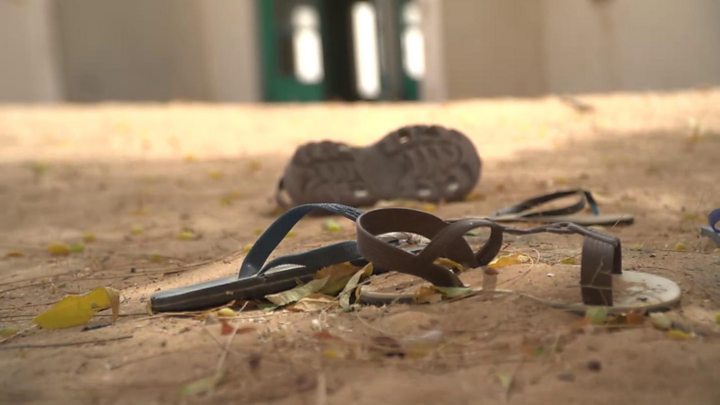
"We started running, many of the girls were screaming," Fatima said. "We were running towards the gate. As we were running the militants were shouting at us to stop. They told us to get in the trucks, that they were there to help us. But we just ran."
The attackers were in military fatigues, but they were wearing sandals and they had beards and turbans on their heads. She knew they were Boko Haram, but some girls were confused and went with them.
As Fatima was running she lost her best friend. Zara Tijjani is a little older at 14, but they grew up around the corner from each other and spent all their time together at school and in the holidays.
'My heart is breaking'
Zara's home is a big mud-brick building in a large compound close to the school. Her father Yussuf is a farmer and community leader. He told us that on the night of the attack, the family heard gunshots from the school and the sound of girls screaming.
"I ran over there to get my daughter," he said. "I was about to climb the fence when I saw the men shooting."
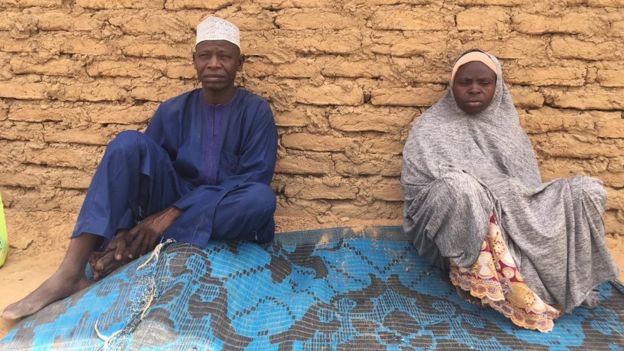
He had to run back to his compound, where he met more than 100 children taking refuge.
He searched and searched through the crowd for his daughter. By the morning he knew that she had been taken.

Read more:
- Nigeria Dapchi school kidnappings: What we know
- Who are Nigeria's Boko Haram?
- The fate of the Chibok girls

As we spoke, Falmata's 25-year-old sister was listening, washing dishes. Absent-mindedly, she swished soapy water around the big plastic buckets.
I started to ask her about her sister.
"We are very close," she said. Then her voice cracked, she stopped. She dropped her head into the nook of her elbow and started sobbing.
"I can't stop thinking about her. The worst thing is that we don't know how she is, we don't know what she is going through."
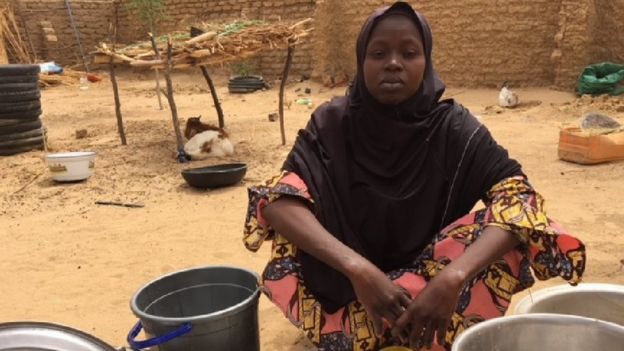
Sitting on a mat outside their house, Zara's mother and father showed us some of her schoolbooks, her name scribbled over and over across the pages. Her favourite subject was business, her friend Fatima had told me. "Yes," her proud father said, pointing to the teacher's full marks etched in red on the pages.
"She's a good girl, so caring," mother Habiba said. "We are very close but now we've lost her. My heart is breaking. She's my daughter and I don't know where she is or who she is with."
'The children of poor men'
Zara is just one of 110 girls who were taken that night. All around the small town of Dapchi, families are grieving.
Like the Manugalawans. Eighteen-year-old Hafsat was in school that night when she heard the gunshots, grabbed her 15-year-old sister Hauwa, and ran.
"The Boko Haram man was shouting at us to stop, he said he would shoot but we kept running," she said.
Hafsat paid the words no heed. They ran towards a perimeter fence and she told her younger sister to climb first. But when she got to the other side, Hauwa was gone.
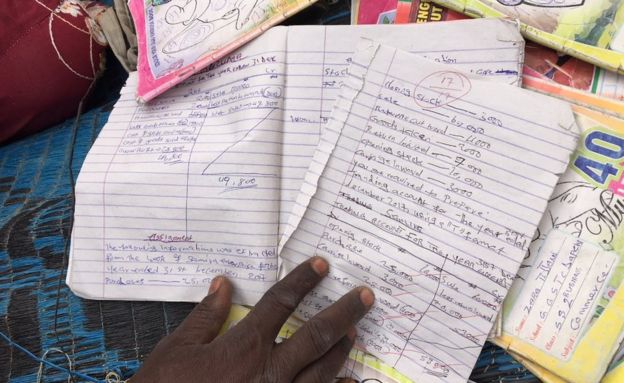
Their mother Joloni Mohamed is angry. "I can't put in words how I'm feeling," she said. "Only God knows."
"At the beginning we were told that our daughters were rescued, that they were on our way back to us," she said. "That was the hardest part."
She was referring to an announcement by the governor of Yobe State two days after the attack, claiming that some girls had been rescued. The following day the governor addressed parents, admitting that the rescue had never happened.
Standing outside as we spoke to Joloni was yet another anguished relative: Her next-door neighbour Aisha Isa Kalallawa. She was holding her phone, waiting to show us pictures of the three sisters she lost - Maryam, Fatima and Falamatu. The youngest was 14, the oldest 17.
On every corner of this small town there is a sad story.
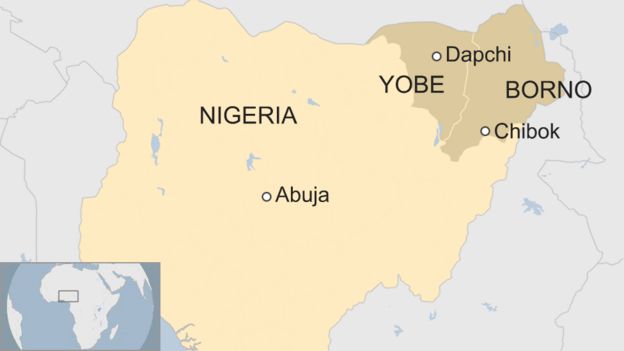
Since the kidnappings, there have been many conflicting lines from the authorities on what exactly happened in Dapchi that Monday night. It wasn't until three days after the assault that they finally acknowledged some girls had been taken. It was another three days before they gave a number of how many were missing.
Now, President Muhammadu Buhari says the army and air force are in pursuit of the girls and are doing everything it can to find them. But most of the parents we spoke to don't feel they are doing enough.
"I don't know why the government has not reacted faster," said Zara's father Yussuf. "But these are not the children of senior politicians, they are the children of poor men."
Over the past week, the echoes of the Chibok kidnapping have never been far from people's minds - least of all the parents of Dapchi. Four years later, more than 100 of those girls are still missing.
The biggest fear of the families here is that they will also wait years until they see their daughters again - that is if they see them at all.
http://www.bbc.co.uk/news/world-africa-43197694
Nigeria Dapchi school kidnappings: What we know
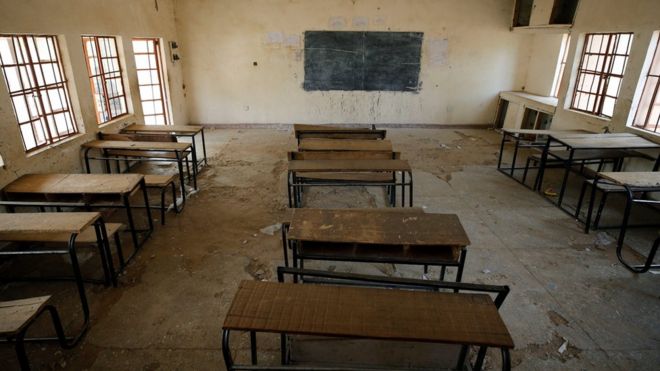 REUTERS
REUTERS
The kidnap of more than 100 girls from a boarding school in north-eastern Nigeria has become shrouded in confusion.
We know that a group of militants, presumably from Boko Haram, arrived in the town of Dapchi, Yobe State, during the evening of Monday, 19 February.
They headed for the Government Girls Science and Technical College, fleeing a little while later.
Originally, it was claimed many of the girls had escaped and no-one had been kidnapped. But a week later, authorities have admitted they were taken by the Islamist extremists.
So, what exactly is going on?
Why don't we know what happened?
The initial confusion appears to have come from a teacher, who spoke to the press after the attack.
He said the militants were searching for food, and not trying to kidnap anyone. The girls, he said, had run into the bush and were hiding.
According to the BBC's Halima Umar, who is based in the capital Abuja, the government seems to have embraced this version of events, only accepting the girls had been kidnapped later on.
However, the story became more confused when different branches of government and the army began diverging in their accounts - to the extent that the rescue of some girls was announced at a time when no official had acknowledged that any had been kidnapped.
How many girls have been taken?
One of the biggest arguments between parents of the missing girls and the authorities has been over the number of students taken.
Parents insisted from the beginning more than 100 girls were missing from the school, which has 926 students. Authorities said the figure was as low as 40 and continued to say that many had run away into the bush and would no doubt reappear soon.
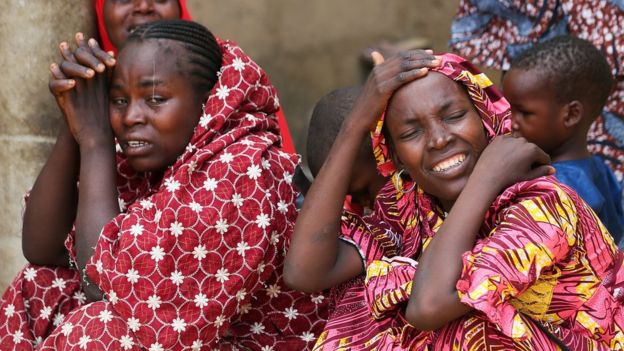 REUTERS
REUTERS
In the end, fed up with the confusion, parents formed a group and produced a list of 105 names.
The government has since come back and said the total number of missing girls is, in fact, 110.
What are the parallels with the Chibok kidnappings?
Will Ross, the BBC World Service Africa editor, noted chilling similarities to the April 2014 abductions in Chibok, some 275km (170 miles) south-east of Dapchi.
On that occasion, he says, the military and the government initially denied the kidnappings and stayed silent as the jihadists drove more than 270 girls into the bush and set up camp.

Four years on and the world is once again getting denials and misinformation from the authorities and disbelief and anger from the parents.
Some in Nigeria have accused the government of being slow to respond or issue public statements.
There is a feeling that no lessons have been learnt by current administration, which come to power partly because of the public anger over the way the previous government had handled the Chibok abduction, and the Boko Haram crisis more generally.
More than 100 of the Chibok girls remain in captivity to this day. Whether the Nigerian authorities will be able to find, and rescue, the Dapchi girls remains to be seen.
Why was there no security at the school?
Despite the kidnap of the Chibok girls in April 2014, there doesn't appear to have been a security guard at the school in Dapchi.
And yet, parents sent their daughters anyway.
The BBC's Abuja reporter says this is down to a renewed sense of optimism which flooded in after Muhammadu Buhari's election in 2015, as well as repeated assurances the army was winning the battle against the Islamist militants.
We also know there were soldiers guarding checkpoints near the town, because Yobe State Governor Ibrahim Gaidam told journalist the militants struck hours after the army withdrew their forces from checkpoints in Dapchi.
The army has now confirmed it did remove the soldiers - and Nigerians want answers on who ordered soldiers to be withdrawn a day before the attack.
Why can't they find the girls?
It has taken a week for the government to accept the fact the girls have been taken and finally launch a large-scale search.
President Buhari says troops and reconnaissance aircraft would be used and no stone left unturned in the hunt for the girls. They are refusing to give any further details of the search.
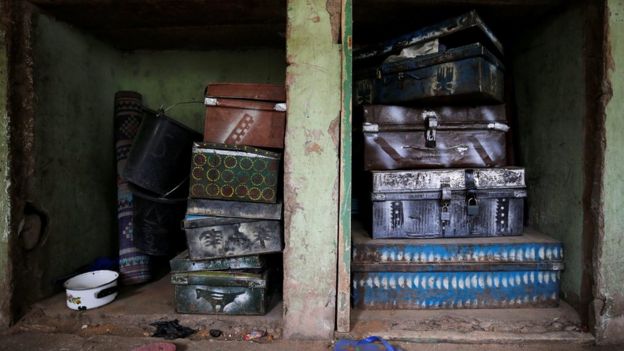 REUTERS
REUTERS
But one local media outlet, the Daily Trust, reports that half the girls have already been whisked out of Nigeria and into neighbouring Niger by the militants.
However, if they are still in Nigeria, our reporter believes they will have travelled to the Sambisa Forest - because, thanks to its vast size and thick tree coverage, it is the only place they can effectively hide.
This is where Boko Haram had its headquarters, and where it took the Chibok girls.
The Nigerian government says it has beaten Boko Haram - is that true?
Major General Roger Nicholas, who leads operations in the north-east, declared the group had been "completely" defeated in January.
This mass kidnapping suggests otherwise.
BBC Africa's security correspondent Tomi Oladipo has previously pointed out these promises contradict the amount of money it is investing in new equipment to tackle the group, and the fact they are known to be active in the Lake Chad basin.
Meanwhile, the BBC has been told that the army had been close to capturing Boko Haram's leader in January, but halted for a number of days before they were attacked.
When they returned, the camp had cleared out.
The army has strenuously denied the report.
No comments:
Post a Comment